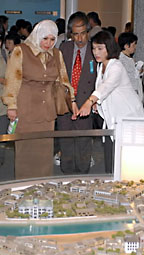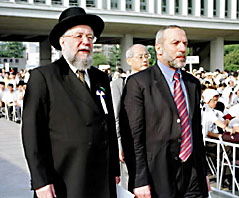 -Iraqi doctor: "Tragedy of DU weapons"
-Iraqi doctor: "Tragedy of DU weapons"
On the 6th, with Hiroshima engulfed in prayer, an Iraqi, an Israeli, a Palestinian, and an A-bomb survivor from the US were in Hiroshima. The terrorist attacks of September 11, 2001, led to the bombing of Afghanistan, the war in Iraq, and the chain of retaliation continues. Those with roles to play on that stage, each from their own distinct position, all accepted the message of Hiroshima and spoke of their desire for peace.
"My country, too, is hibakuchi (a place exposed to radiation)." The two Iraqi doctors had come to Japan to raise the issue of damage from depleted uranium weapons used in the Gulf War and the more recent war on Iraq. It was their first Peace Memorial Ceremony. "I kept seeing the faces of our children suffering from disease. It was painful." With the fighting still going on, he is speaking out against DU weapons, also known as "radiological weapons." His desire for peace is combined with his feelings for the exposed victims he has been unable to save.
The doctors from the city of Basra in southern Iraq are Jawad Al-Ali (59) and Jonan Hassan (47). Basra was a primary battlefield in 1991 during the first Gulf War. In the most recent war, vast quantities of DU weapons were used again.
8:15 a.m, mokuto (silent reflection). "This war slaughtered innocent women, children, and the elderly. It destroyed the environment, most notably through radioactive contamination that will be with us for billions of years." As the doctors listened to the Peace Declaration, they thought of the "friends who died in the war, and our patients suffering from their illnesses." His voice dropped off.
Law and order in Iraq continues to deteriorate. Water and electricity are on and off. Patients continue to increase, but doctors are helpless without adequate equipment and medicine. The two doctors see DU as the primary factor. In Basra in 1988 before the Gulf War the cancer rate was 11 per 100 thousand population. This figure had risen to 75 by 1998, to 115 by 2001, and it continues to rise.
"Why must the children of Iraq be punished for the sins of the United States?" asks Hassan.
The Peace Memorial Museum. As the two doctors listened to explanations of the displays from Haruko Moritaki, a leader of the NO DU Hiroshima Project, they focused intently on the displays showing how Hiroshima recovered from utter ruin. "Someday, we will rebuild like Hiroshima." Their serious expressions relaxed for a moment.
Iraq and Hiroshima, both damaged by war and radiation. Ali says, "Hiroshima understands the pain of the world. I wish it would do more to call everyone together to stop destruction by the superpower."
- Religious leaders from Israel and Palestine attend together
Two religious leaders from Israel and Palestine, where war is ongoing, participated in the Peace Memorial Ceremony. While in Hiroshima, they saw and heard about the atomic bombing at the museum and elsewhere and deepened their feelings about peace.
Rav Yisrael Meir Lau, a central Jewish leader in Israel and Sheikh Talal Sedir, religious advisor to Palestinian Chairman Arafat, sat together observing the solemn ceremony with serious expressions.
Lau said, "Violence solves nothing." Sedir said, "The desire for peace has grown. We must stop the fighting in the Middle East." After the Ceremony, they met with Prime Minister Koizumi and enthusiastically agreed when he said, "Reconciliation is the most important path to peace."

(Caption)(Top) Hassan (left) and Al-Ali (middle) receiving an explanation in the Peace Memorial Museum from Moritaki (right), who went to Iraq in June.
(Bottom) Lau (left) from Israel and Sedir (right) from Palestine at the ceremony.
    
|